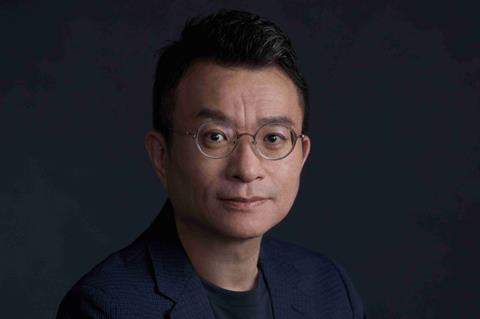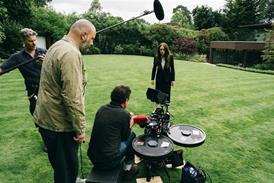
Wen Tien-hsiang is the man behind the Golden Horse, from the Taipei Golden Horse Film Festival and co-production platform Golden Horse Film Project Promotion to the Golden Horse Film Academy and Golden Horse Awards.
He took the reins of the Chinese-language film industry’s leading annual event in 2009 when Taiwanese auteur Hou Hsiao-hsien invited him to head the organisation’s executive committee.
Ahead of the 60th edition of the Golden Horse Awards, Wen talks to Screen about a diverse selection of nominees from Malaysia, Hong Kong, Taiwan and even mainland China.
Malaysia leads the pack
This year has the highest number of Malaysian films in Golden Horse’s history. Snow In Midsummer, which is co-financed with Taiwan and Singapore, leads with nine nominations and revisits the tragic race riots that occurred in Kuala Lumpur on May 13, 1969.
“Representatives from Singapore’s Infocomm Media Development Authority (IMDA) are expected to attend the awards ceremony but not the National Film Development Corporation Malaysia (FINAS),” says Wen. I’m curious to know the reaction in Malaysia.
“[Snow In Midsummer] director Chong Keat Aun is new but not young and shot his first feature The Story Of The Southern Isle like a Hou Hsiao-hsien film, but with a horror feel. The film’s win of Golden Horse’s best new director in 2020 has attracted the interest of foreign investors.”
Taiwan is increasingly investing in projects from Malaysia, according to Wen. “Golden Horse plays the role of a facilitator,” he says. “When we gather talents together, they will find a way to collaborate with each other. More Taiwanese companies are willing to invest in Malaysian productions and more Taiwanese actors are keen to take part.”
Another Malaysian film, Abang Adik, which focusses on the underclass of the country, has secured seven nominations, including best actor for Taiwanese actor Wu Kang-ren and best new director for Jin Ong, who is the producer of Malaysian drama Shuttle Life and the manager of Malaysian actor Jack Tan. Its Indian director of photography Kartik Vijay is nominated for the third time, following The Garden Of Evening Mists and The Soul.
Hong Kong finds a niche
“Hong Kong cinema might have lost its box office dominance, but non-mainstream Hong Kong films have recently found a niche for themselves,” says Wen, citing titles Suk Suk, Drifting, My Prince Edward, Hand Rolled Cigarette, The Sunny Side Of The Street and A Light Never Goes Out.
“Some of these received financial support from the Hong Kong government. Veteran filmmakers such as Stanley Kwan, Fruit Chan and Derek Yee lend their support as producers, while established actors like Sylvia Chang and Anthony Wong are also supportive.”
Yee is the producer behind two films with five nominations apiece. “In Broad Daylight is backed by One Cool but not as a China co-production,” says Wen. “It has an ensemble cast led by Jennifer Yu and supported by veteran actors. Time Still Turns The Pages – by a first-time director and running for best film – can be melodramatic but it has displayed great techniques with a totally unexpected twist. Derek Yee shows his commitment to realising the dreams of young directors while heading the Hong Kong Film Awards.”
Also from Hong Kong are The Lyricist Wannabe by Wong Yee-lam, who is still active in Hong Kong although she has settled in Taiwan with her Taiwanese husband, and Fly Me To The Moon, produced by Kwan and directed by Sasha Chuk based on her personal stories about two sisters who are born in China and grew up in Hong Kong. Chuk plays the role of the older sister and Taiwanese actor Wu Kang-ren from Abang Adik is also in the cast.
Taiwan picks up pace
With seven nominations, The Pig, The Snake And The Pigeon is the most important Taiwanese film for the Golden Horse this year, says Wen.
“Hong Kong director Wong Ching Po is back in top form,” he adds. “It has a fast pacing like a Hong Kong film and its 10-minute opening chase scene is comparable to those from Hong Kong and South Korea. The action scenes are done by Hung Shih-hao from Taiwan who is known for The Scoundrels. Ethan Juan, who became a Golden Horse best actor at a young age, shows his maturity in the film.
“The film’s Hong Kong characteristics are not a disadvantage but a proof that Hong Kong-Taiwan collaborations can bring out the best of both places and that genre films, which tend to have a bigger budget and are more difficult to make, can be done well.”
Marry My Dead Body, with eight nominations, starts as a screwball comedy before evolving into a melodrama. “It’s not suitable for top international festivals but it’s a big local hit,” says Wen of the film, which is Taiwan’s submission for the international feature film Oscar. “It’s fun to sabotage traditional supernatural beliefs with LGBTQ elements,” Wen says.
Doors remain open to China
“They’re worried to take part but Golden Horse still opens the doors to them,” says Wen says. Last year a few short films from China were nominated, including best documentary short Will You Look At Me, whose New York-based director Huang Shuli was on hand to receive the award.
This year saw 210 submissions from Hong Kong, China and Macau, none of which are the main melody titles. There are more narrative features from China, including four that received nominations.
Wen explains: “Stonewalling is labelled as a Japan production although the production was all done in China; This Woman was submitted by Tan Chui Mui’s Malaysia-based Da Huang Pictures; Carp Leaping Over Dragon’s Gate is about a mother’s desperate attempts to get her daughter through the college entrance exam, which is the kind of film from China that used to come to the Golden Horse; and The Mountain Is Coming is a satire about the reallocation of power, the kind of films that Taiwan hasn’t been making.”
“The Taiwanese audiences are very curious about these films, which were sold out in no time,” he adds. “The filmmakers of the four films will attend the awards ceremony.”
“Golden Horse hasn’t changed its course. It will continue to be an open and fair stage to Chinese-language cinema,” Wen says.























No comments yet